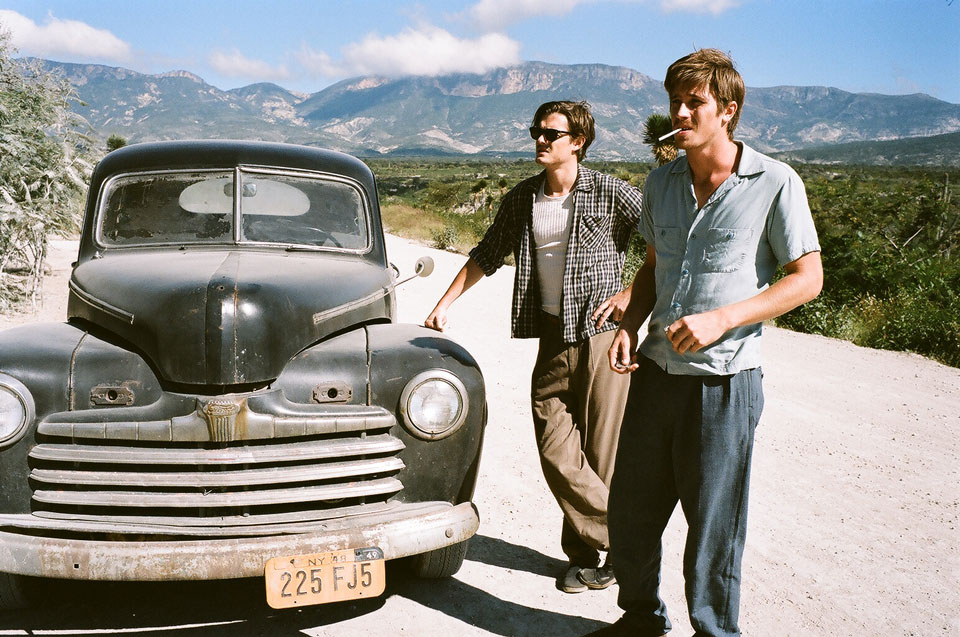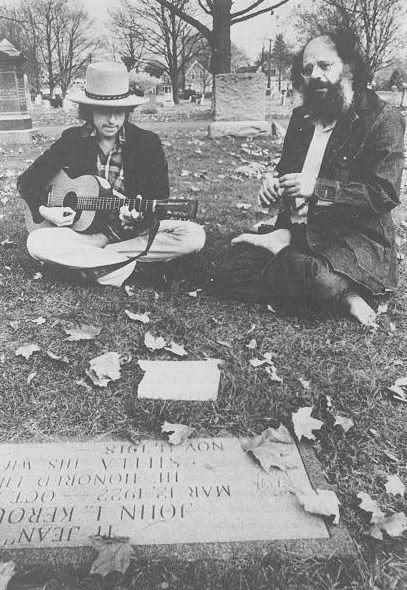
By David Sterritt
Jack Kerouac, the novelist and poet who gave the Beat Generation its name, died 43 years ago on 21 October 1969 at the age of 47. This Friday, the long-delayed movie version of Kerouac’s autobiographical novel about crisscrossing the United States with his hipster friend Neal Cassady in the 1940s, On the Road releases. When the novel was published in 1957, six years after he finished writing it, Kerouac dreamed up his own screen adaptation, hoping to play himself (called Sal Paradise in the novel) opposite Marlon Brando as Dean Moriarty, the Cassady character. He wrote to Brando but Brando didn’t write back, so the dream production remained a dream. Now that it’s reaching the screen with Sam Riley and Garrett Hedlund as Sal and Dean, we can only guess what Kerouac would have made of it.
On the Road remains Kerouac’s most widely acclaimed novel, partly for its literary merits — boundless energy, quicksilver prose, an almost mystical view of the American landscape — and partly because of the legendary way he created it, typing it on a 120-foot scroll so he wouldn’t have to interrupt the flow of words by changing paper. Kerouac wrote many other works, including several novels, a great deal of poetry, two books about Buddhism, a compendium of his nightly dreams, and a play that inspired the 1959 movie Pull My Daisy, a mostly playful glance at the mercurial Beat lifestyle. But his most prolific period was limited to the 1950s, when he wrote nearly of his significant works.
Weighed down and ultimately defeated by alcoholism and depression, Kerouac produced little of note after 1960 except the novels Big Sur and Vanity of Duluoz: An Adventurous Education, 1935-46, published in 1962 and 1968 respectively. He felt badly misunderstood by the American public, and although he was right, he was also to blame. His footloose characters and propulsive writing style had convinced admirers and detractors alike that being Beat meant disdaining the ordinary social rules — which was true as far as it went, but far less important to Kerouac than the need to be both “beat” and “beatific,” meaning saintly in a literal sense. Appearing on William F. Buckley Jr.’s conservative TV show a year before his death, Kerouac said he rejected the “mutiny” and “insurrection” that the Beats had come to connote; instead he favored “order, tenderness and piety.” By this time, however, the Beats had given way to the flower children as the American gadflies par excellence, and few were interested in the profoundly religious sensibility — oscillating between Catholicism and Buddhism but always deeply felt — of a once-blazing rebel now seen as a soggy old complainer.
Although the original Beats were a loosely knit crew, its key members were unquestionably Kerouac, fiercely committed to the spontaneous writing he pioneered; Allen Ginsberg, a modernist poet inspired by everything from 19th-century verse to late-night radio patter; and William S. Burroughs, a storyteller with a schizoid style and a hearty appetite for sex, drugs, and metaphysics. Their rebellious values have stayed in the social imagination ever since their early days as friends and fellow travelers, influencing the cyberpunks of the 2000s no less than the hippies of the 60s and the punks of the 70s.
Two ideas united them: a shared rejection of consumerism and regimentation, and a collective desire to purge their lives of spiritually deadening dross. Their rallying cry was a call for remaking consciousness on a deeply inward-looking basis — revitalizing society by revolutionizing thought, rather than the other way around, through cultivation of “the unspeakable visions of the individual,” in Kerouac’s unforgettable phrase. They had different ways of accomplishing this. Kerouac became a self-described “great rememberer redeeming life from darkness” in the many novels he wrote; Ginsberg invented a new variety of incantatory, almost shamanistic verse; Burroughs cut, folded, and shuffled his pages to bypass his ego and extract fresh, outlandish truths. The ultimate goal for them and their followers is what Kerouac called “eyeball kicks,” the jolts of cosmic energy that divide everyday diversions from visionary art.
The new movie version of On the Road was written by Jose Rivera and directed by the respected Brazilian filmmaker Walter Salles, who deserves an Oscar for just getting the picture finished. A number of writers, including major ones like Russell Banks and Michael Herr, have tried and failed to complete satisfactory screenplays during the 33 years that producer Francis Ford Coppola has owned the adaptation rights. Rivera’s effort finally captured the tone that Coppola was looking for, and Salles allowed the actors to improvise at times, which is very much in the Beat spirit. Reviews were mixed when the picture premiered at the Cannes International Film Festival last spring, but its American distributors, IFC Films and Sundance Selects, have expressed their optimism by scheduling its theatrical debut for December 21st, a popular timeslot for films with award possibilities. Kerouac loved movies, and one hopes he would have smiled on this big-screen reincarnation of his profoundly personal tale.
David Sterritt is a film professor at Columbia University and the Maryland Institute College of Art, and professor emeritus at Long Island University. A noted critic, author, and scholar, he is chair of the National Society of Film Critics and chief book critic of Film Quarterly, and was for many years the film critic for The Christian Science Monitor. His books include The Beats: A Very Short Introduction, Mad to Be Saved: The Beats, the ’50s, and Film and Screening the Beats: Media Culture and the Beat Sensibility, and he serves on the editorial board of the Journal of Beat Studies. His writings have appeared in the New York Times, Huffington Post, Journal of American History, Journal of Aesthetics and Art Criticism, Beliefnet, Chronicle of Higher Education, and many other publications. Sterritt has appeared as a guest on CBS Morning News, Nightline, Charlie Rose, CNN Live Today, Countdown with Keith Olbermann and The O’Reilly Factor, among many other television and radio shows.
The Very Short Introductions (VSI) series combines a small format with authoritative analysis and big ideas for hundreds of topic areas. Written by our expert authors, these books can change the way you think about the things that interest you and are the perfect introduction to subjects you previously knew nothing about. Grow your knowledge with OUPblog and the VSI series every Friday!
Subscribe to the OUPblog via email or RSS.
Subscribe to only film and television articles on the OUPblog via email or RSS.
Subscribe to only literature articles on the OUPblog via email or RSS.
Subscribe to only VSI articles on the OUPblog via email or RSS.
Image credit: Sam Riley and Garrett Hedlund in On the Road. Photo © Gregory Smith. Source: ontheroad-themovie.com. Used for the purposes of illustration.
The post Jack Kerouac: On and Off the Road appeared first on OUPblog.




 Today is
Today is 
